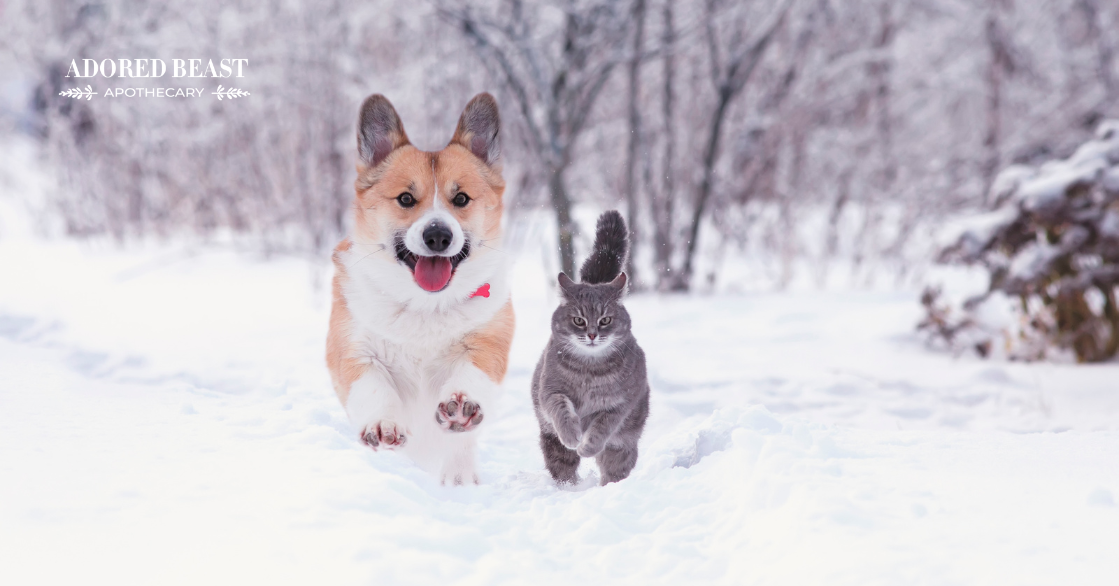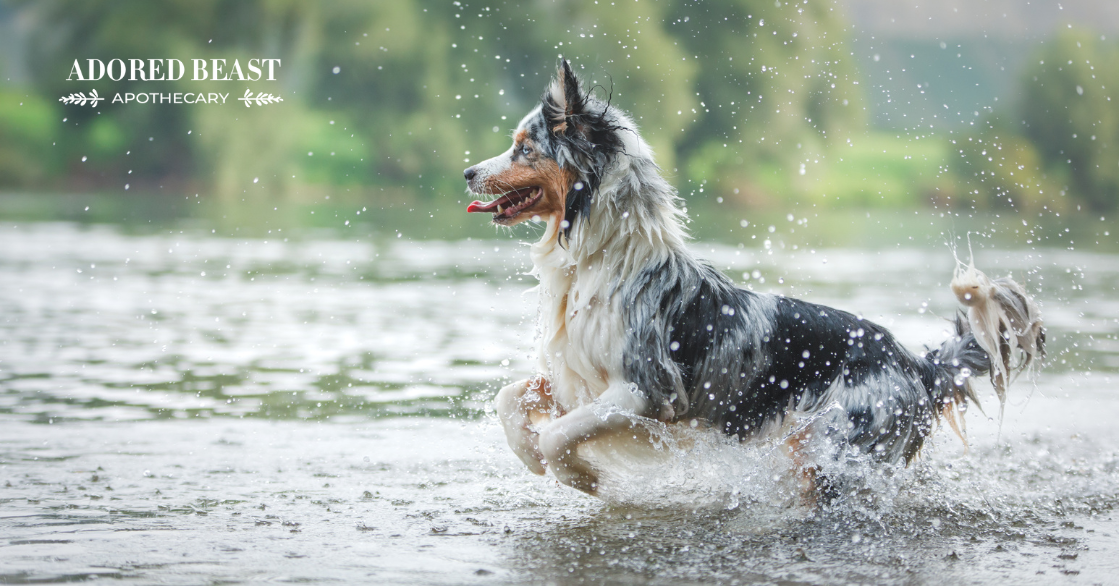Happy new year all! As we welcome another new year, and think back on what we’re grateful for from the past year, we always think about our animals and all they’ve given to us. The unconditional love, the consistent loyalty, the confidence to grow together… maybe even a little stress here and there (and that’s ok!).
At the start of each year (and of course throughout the year as well), we always try to think about ways we can work to improve dog and cat health. We’re all on a journey to help our animals live the longest, healthiest, happiest lives possible, and taking new steps all the time ensures that we’re moving forward to achieve that.
Dog and Cat Health: 5 Steps for a Healthy Year
This year, when it comes to dog and cat health, consider these 5 categories.
1. Clean Up a Leaky Gut
We say this each and every year (and many times throughout the year), but it always bears repeating: as many as 80% of the body’s immune cells are in the gut. That means, for overall health to flourish, the gut also needs to flourish.
And to keep a gut healthy, you first need to make sure it is able to function. And that means making sure leaky gut isn’t a problem.
Leaky gut is exactly what it sounds like – a gut with holes that allow things to leak out. The gut has a delicate lining that allows tiny digested nutrients to pass through to the bloodstream. That’s how you and your animals actually get their vital nutrition. At the same time, it keeps out toxins, pathogens, and undigested food particles. However, if damaged, these holes in the delicate mucosal lining stretch, and it can no longer filter out larger food particles, bacteria and toxins.
At this point, the body actually starts to become malnourished, no matter how great a diet they have or the amount of food they eat. It also becomes overloaded and can’t fight the toxic intruders, and then the problems really start. Leaky gut has been referred to as the “great mimicker,” appearing in the form of many chronic diseases that plague our beloved animals:
- Diseases of the skin (allergies), thyroid, joints/arthritis, heart disease, spinal cord, eyes or brain
- Inflammatory bowel disease, interstitial and chronic cystitis, collapsing trachea, laryngeal paralysis, liver, gallbladder, adrenal (Cushing’s disease) and pancreatic disorders.
- Behavioural problems such as aggression and obsessive-compulsive disorders or self-mutilation.
- Autoimmune disease and nutritional deficiencies, which, left untreated, could lead to some forms of cancer because of the chronic inflammation.
Cleaning Up Leaky Gut
Start with the Leaky Gut Protocol. This protocol was specifically designed to be an all-in-one tool to target and repair leaky gut. It features a gentle, yet highly effective, combination of herbs, pre and probiotics, digestive enzymes, liver and detoxification support, homeopathic remedies and nutraceuticals that address and repair the root cause of Leaky Gut.
With the protocol, add these foods to help support a much healthier digestive system.
- Kefir Or Raw Live Yogurt – Look for products from Jersey cows, goats or use coconut kefir. Give 2 Tbsp daily for an average (30 to 50 lb) size dog
- Fermented Vegetables – Work up slowly to 1 to 3 tsp a day for every 20 pounds of body weight.
- Bone Broth – Bones contain proline, which tightens and builds cell structure, glycine, which supports the synthesis of collagen, gelatin, glucosamine and minerals, which are the building blocks of the digestive system. Give 1 Tbsp per day to small dogs, 2 Tbsp for medium, 3 Tbsp for large dogs and 4 Tbsp for giant breeds.
- Phytoplankton – If you find a good source, you’ll only need 1/16 to 1/8 of a tsp per day. Look for one that is grown on land, free of heavy metals, is non GMO, and 100% ocean friendly.
- Coconut Oil Or Hemp Oil – Use coconut oil or hemp oil to supply medium chain fatty acids. Give 1 tsp per 10 pounds of body weight but start with ¼ tsp and work up over a two to three week period.
2. All About Antioxidants
With cancer in pets seemingly on the rise year after year, we need to really evaluate what we’re doing to give our animals the best fighting chance at prevention. And without a doubt, one of the best things we can do to boost dog and cat health is add antioxidants to the diet. Antioxidants fight free radicals, which are unstable atoms that do major damage to cells, leading to oxidative stress. This has been linked to cancer (along with many other conditions and diseases in the body).
Antioxidants work by scavenging free radicals and destroying them! And thankfully they are easy to add to the diet.
Some of the best sources for dogs and cats include:
- Phytoplankton
- Chaga and turkey tail mushrooms
- Fruits and vegetables – berries, apples, bananas, broccoli, spinach, cabbage
3. Brain Boost
When we think about pet health, we often think about the gut, the skin, the joints, even the heart. The brain, that vital organ that runs the body, all too often gets forgotten about! This year, when you think about improving dog and cat health, think about the brain!
There are two ways your can “feed” your dog’s brain to keep it healthy.
1. Food. A diet that is nutrient-rich protects the brain and improves brain performance. And there are many different foods you can feed to help give the brain that extra support it needs to stay healthy.
- Medicinal mushrooms like lions mane, chaga, and turkey tail are all good for supporting brain health
- Antioxidant rich foods can help combat oxidative stress, which can damage brain cells
- Omega 3s, particularly DHA, to support not only brain development, but maintenance of healthy brain function. Algae oil is a good choice for its high DHA content
- Coconut oil has been scientifically proven to improve brain function in older dogs and people.
- Eggs are a good source of choline, which helps reduce inflammation and promotes brain function, like maintaining memory and communications between brain cells.
2. Mental Stimulation. Just like with people, if your animal isn’t using their brain, they can lose some of the higher functions, like problem solving for example. No matter your pet’s age, engaging the brain helps to slow neurological aging and keep the mind sharp. There are several things you can actively work on to boost brain health:
- When on your daily dog walks, switch up the route
- Every so often, head somewhere new to explore
- Find (or create) puzzle games that your dog or cat has to solve – these are great for exercising the brain!
- Teach a new trick each week
- Play with your pet – talk to them, throw balls or mice, chase the, (if they like that)
- Enroll your dog in agility classes
- Get your cat a cat tree or build ramps so they can explore
- Consider a compatible friend if you only have a single cat or dog
4. Fun Facts About Fats
The right fats are such a crucial part of the canine and feline diets, but they’re often overlooked. Fats provide energy, help the body absorb other nutrients, transport fat-soluble vitamins A, D, E, and K, aid in the digestion of vitamin D, which is needed to utilize calcium in the body, and help keep cells strong and support a healthy nervous system, brain, liver, blood, skin, and hormone function.
See? Fats are really important. But as mentioned, they need to be the right ones.
Saturated fat (mainly from animal protein sources), are important for energy, but too much saturated fat can lead to health problems. If you’re feeding a balanced diet, your pet is likely getting enough saturated fat and you don’t need to add more.
Good fats, like omega 3s, however, may be lacking. Omega fats are a group of polyunsaturated fats that your pet’s body doesn’t produce on its own. Since they’re essential, they need to be eaten. Most dogs and cats don’t actually get enough omega 3s in their diets. So supplementing is a good idea.
Extensive research also shows they have numerous health benefits for the:
- brain
- skin & coat
- eyes
- gut
- reproductive system
- heart
- joints
If you want to add healthy fats to your dog’s or cat’s diet, we like algae oil and hemp seed oil. Algae oil provides high levels of DHA and EPA, without harming the oceans. Hemp seed oil contains GLA, an omega-6 fat with anti-inflammatory effects, and SDA (stearidonic acid) which is a precursor to EPA.
Want to know more about omega fats? This article goes in depth!
**Note: Make sure your oil is non-GMO, grown without herbicides or pesticides, cold pressed, hexane free, sustainably harvested, unrefined and unbleached.
5. Bones as a Bonus
Do you already feed bones to your animal? A diet without bone is nutritionally lacking – raw meaty bones are a rich source of minerals like calcium, phosphorus, and magnesium. Both dogs and cats can benefit from a little raw bone action in the diet. Chewing is a natural activity for dogs and cats, and so a raw bone can help provide mental stimulation – which is just as important as physical exercise!
Plus, chewing on raw bones is really good for your animal’s teeth. Bones also work as a natural tooth brush to help remove plaque from the mouth. A recent study shows that raw meaty bones are highly effective for cleaning tartar off the teeth! For your kitties RAW chicken necks are amazing!
For more on finding the right bones, read this post.
Bone broth is another great addition – it gives some of the best nutrients of bones, plus it’s packed with glucosamine, chondroitin, and hyaluronic acid. As a bonus, it’s very easy and cost effective to make a big batch and freeze it in smaller portions. Here’s the recipe.
Cheers to Dogs and Cat Health
Whether you implement all of these steps, or just one or two, you can make huge progress towards overall health for your animal this year. And if you already do all of these things, amazing!
We know that, since you’re here, dog and cat health is a top priority for you every year. And no matter where you are on your journey, we’re always here to help! We know sometimes it can be tough, or feel overwhelming. Know that you are not alone. You’re doing your best, and your adored beast appreciates all that you do <3












